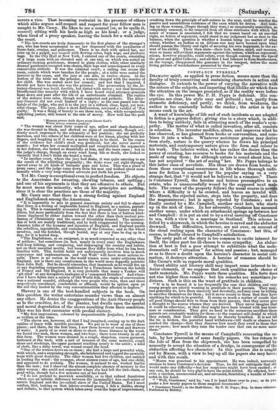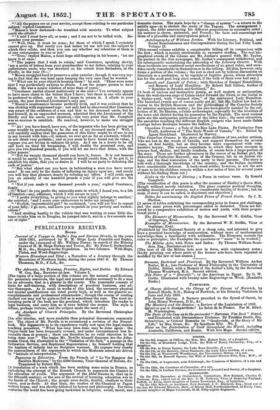CONSTANCE TYRRELL. * Dimautric spirit, as applied to prose fiction, means
more than the faculty of truly conceiving and sustaining characters in action and dialogue. It extends to the power of varying the narrative with the nature of the subjects, and imparting that lifelike air which fixes the attention on the images presented, as if the reality were before the eye. In this power Mr. P. H. Pepys is deficient. His con- ceptions are clear, his style easy and pellucid ' ⢠but, partly from dramatic deficiency, and partly, we think, from weakness, the author is too constantly 'before the reader ; the artist is by no means sunk in the art.
A want of knowledge of life and of such incidents as are adapted to fiction is a graver defect ; giving rise to a story which, in addi- tion to being unlikely, fails in attracting much of the reader's sym- pathy. The matter of what is called invention, after all, consists in selection. The inventor modifies, alters, and improves what he has observed, or has gleaned from books or conversation, and com- bines it into a whole. Whatever assistance genius may derive from study, nature is the quarry whence he draws his principal materials, and contemporary nature gives the form and colour to his work. The inferior writer, who has rather the desire than the power of creating, has recourse to books for his materials and the mode of using them ; for although nature is round about him, he has not acquired " the art of seeing " her. Mr. Pepys belongs to this latter class of novelists. His ideas are drawn from books, or from those exceptional occurrences in life whose thorough unfit- ness for fiction is expressed by the popular saying on a very strange fact, that "it would not be believed in a romance." There is Constance Tyrrell, the heroine and heiress presumptive to an estate, who is unsuccessfully wooed by the supposed next male heir. The owner of the property follows the usual course in noills where a difficulty is to be created, and leaves an invalid will. Mr. Mason, the rejected suitor, steps into the property, and does the magnanimous ; but is again rejected by Constance ; and is finally ousted by a Mr. Campbell, another next heir, who starts up in the nick of time. In her adversity, Constance has assumed another name, under which an attachment springs up between her and Campbell : it is put an end to by a rival carrying off Constance to sea, with a view to a marriage in Scotland. This scheme is foiled by a shipwreck, in which the heroine is saved and the abducter drowned. The difficulties, however, are not over, on account of the cloud resting upon the character of Constance : but this, of course, is finally cleared to Campbell's satisfaction.
The early part of the story is too common to excite interest for itself, the other part too ill-chosen to raise sympathy. Au abduc- tion at best is but a poor attempt to substitute what the melo- dramatists call " situation " for action and passion; but, managed so as to throw a doubt upon the heroine's character in social esti- mation, it destroys attraction. A heroine of romance should be like Caesar's wife as regards moral qualities. Great ability and literary skill may impart some interest to in- ferior elements, if we suppose that such qualities made choice of unfit materials. Mr. Pepys wants these qualities. His forte does not rise higher than remark ; but his remarks are sometimes ju- dicious. Such is this on the want of gratitude in children.
" It is to be feared it is too frequently the case that children and very young people are utterly wanting in gratitude to their parents. They may, and generally do, love them sincerely and devotedly, and may even be willing to sacrifice themselves for them ; but it never occurs to them that they have anything for which to be grateful. It seems so much a matter of course that all good things should flow to them from their parents, that they never give a thought to the source whence they are derived. They never imagine that it could be otherwise, or that they might have been treated with less kind- ness or consideration. They give no heed to the numerous sacrifices those parents are constantly making for themâto the constant self-denial to which they submit, that their children may be thereby benefited. It is not till the tie is broken, the parental hand withdrawnâtill death or absence has marked the changeâthat they discover how much they owed to those that are no more; how much they miss the tender care that can no more assist them."
Constance Tyrrell is the means of Campbell's recovering the es- tate, by her possession of some family papers. On her return to the Isle of Man from the shipwreck, she has been compelled by necessity to accept the situation of a drudge, in consequence of the abduction affecting her character. In this position she is sought out by Mason, with a view to buy up all the papers she may have ; and with this result.
"Mason was punctual to his appointment. He was, indeed, nervously anxious to learn Constance's decision. True, he did not anticipate that she would make any difficultyâbut her suspicions might have been excited ; at any rate, he should be very glad to have the point settled. He affected, how- ever, a careless, unconcerned air, and advanced, flourishing a bundle of bank- notes in his hand.
" 'Well, Constance,' said he, am I to band these over to you ; or do you prefer a few musty papers to these magical documents ?'
⢠Constance Tyrrell; or the Half-Sister. By P. H. Pepsi, Esq. In three volumes. Published by Bentley.
"'All the papers are at your service, except those relating to one particular subject,' replied. Constance. "Mason's brow darkenedâhe trembled with anxiety. To what subject could she allude?
" said I must have all, or none ; and I am not to be trifled with. Re- member your promise.' " Well, then, it must be none; for those of which I speak I certainly cannot give up. But surely you had better let me tell you the subject to which they relate, and then you can say whether my retention of them is of any consequence to you or not.'
" True' ' replied Mason, a faint hope still lingering in his bosom ; ' let me know it at once.'
"'The papers that I wish to retain,' said Constance, speaking slowly, 'are a series of letters from your grandmother to my father, relating to your unfortunate uncle, who was drowned on his return from Barbadoes, in the Firefly, in the year 18â.' "Mason struggled hard to preserve a calm exterior; though it was very try- ing to find that she was bent upon keeping the very ones that be wanted. " What can be your object in keeping them ? ' he said. Those were some that I was particularly anxious to obtain. I am the proper person to have them. He was a nearer relation of mine than of yours.' "Constance smiled almost maliciously as she saidâ' You certainly appear to have more claim to the letters than I have ; but there is one who should be preferred to either, and to him I mean to return it. I allude to your cousin, the poor drowned Lieutenant's only son.'
"Mason's countenance became perfectly livid, and it was evident that he was choking with suppressed rage : not only had he discovered that Constance was aware of the existence of a son and heir to his deceased uncle, but he had himself, in an unguarded moment, admitted that the Lieutenant of the Firefly and his uncle were identical,âthe very point that Mr. Campbell was so anxious to establish. He resolved, however, to make one struggle more, " Ah ! you have heard, have you, of the impostor who has been giving me some trouble by pretending to be the son of my deceased uncle ? Well, I will candidly confess that the possession of this letter might be of use to me in my lawsuit with himâif, indeed, we ever get as far as a lawsuit, which I de not think very probable ; and as you seem to have found out its value, I suppose you are trying to enhance its price. As I am in a hurry to be off, and have no time for bargaining, I will double the promised sum, and give you two hundred pounds, if you will let me have that letter, with the other papers.'
" Not for twenty thousand should you have it, James. It is not because it would be useful to you, but because it would enable him, if he got it, to establish his claim, that you so desire it. I will be no party to defeating the ends of justice.' "'But what object can you have in befriending a man you have never seen ? It can only be the desire of inflicting an injury upon me ; and surely you will buy that pleasure dearly by refusing my offers. I will settle upon you an annuity of one hundred pounds a year if you will give me the letter.'
"'Not if you made it one thousand pounds a year,' replied Constance, firmly.
" cWhat ! do you prefer the miserable state in which I found you, to a life of comfortânay, affluence, which I will secure to you ?' " ' I prefer everything, to giving to you what rightly belongs to another,' she retorted ; and I scorn your endeavours to bribe my integrity.'
" Foolish, impracticable girl !' he exclaimed, you will yet live to repent of your folly. t go now, and leave you to perish in your poverty and wretch- edness !'
"And striding hastily to the vehicle that was waiting at some little dis- tance to take him on to Douglas, he jumped into it, and in a few seconds was out of sight."



























 Previous page
Previous page